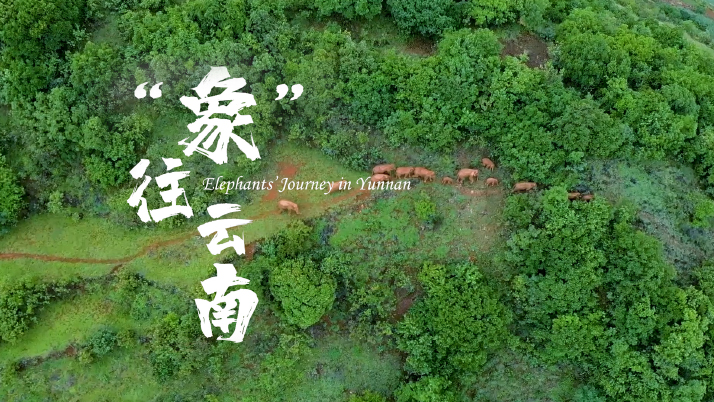| Lifestyle |
| The untold escapades of the wild Asian elephants in Yunnan | |
|
|
 A still from Elephants' Journey in Yunnan, a documentary focusing on the wandering wild Asian elephant herd in Yunnan Province (YIN KANG)
Elephants' Journey in Yunnan, a documentary focusing on Asian elephants in said province, made its debut on October 11 during the opening ceremony of the 15th Meeting of the Conference of the Parties to the United Nations Convention on Biological Diversity (COP15) in Yunnan's capital city of Kunming. In March 2020, 16 wild Asian elephants left their natural habitat in Xishuangbanna, Yunnan. They then headed north and returned home in September 2021 after covering a total distance of 1,300 km. Their 17-month-long trek came with many an unseen tale of the troupe's explorations and its connections with people. Following the initial positive viewer feedback, its producer Feng Ying breathed a sigh of relief. The Yunnan Media Group reporter first started preparing for the visual undertaking in September, when the COP15 organizing committee asked the group to create a video that could serve as a conference "warm up." The lens was to zoom in on the herd as many netizens referred to them as the real-life physical representatives of the meeting given their widely watched activities in Kunming in the leadup to the gathering. Feng, who had previously covered part of their voyage, proved the right production fit. "I wanted the film to show viewers never-before-seen footage and make audiences empathize with the animals' feelings. Elephants and humans share many similarities, for instance, they display emotions like sadness, happiness and anger," she told Beijing Review. "The documentary reveals people's increasing awareness of wildlife protection; the herd's story of moving up north and then traveling back south makes for a vivid promotion of this rare species," she said. Giants are a-coming In China, the Asian elephant, a Class I national protected animal, predominantly resides in the rainforest of Yunnan, also China's most biologically diverse province with a wide-ranging ecological environment. As the largest land animal in all of Asia, the elephants face various risks such as injury, disease, poaching and loss of habitat. The past three decades witnessed multiple efforts in Asian elephant protection as well as in the improvement of the species' living conditions. Thanks to the progress, the number of Asian elephants in Yunnan has increased from 150 to about 300. "I was confused upon hearing the news that the Asian elephants were making their way up to north Yunnan. I had never seen them, except for at zoos and the Xishuangbanna Wild Elephant Valley," Feng said. The latter is China's first national elephant-themed park. Tracking the trunks online developed into a public feast for the eyes. Short videos and news snippets on social media platforms offered people the most up-to-date information on the herd's movements. Unlike the online viewership, the Yunnan Provincial Government remained on edge. Wild elephants are sensitive and can become aggressive when they feel insecure or threatened. Considering local departments lack the experience to deal with such long-distance migrations, provincial authorities promptly established a new headquarters including forestry and grassland, emergency management, and public security personnel, all executed under the Central Government's guidance. The new headquarters mobilized a flood of human and material resources to track the elephants 24/7. Feng said it was unlikely their actions would interfere with the herd's behavior as they seemed to have already firmly decided on their plan. Members therefore had to help them choose safer routes or better timing and avoid having the animals crash into densely populated areas by applying soft and flexible methods, like leaving food for them along the desired route. "They have done a good job at emergency prevention and control, so there were no people around when the elephants would enter any given village; no conflict arose throughout the months-long journey," Feng said.  Feng Ying, producer of Elephants' Journey in Yunnan (ZHANG WEI)
Forging a bond When the animals arrived in Yuxi in June, Feng joined the team to monitor the migrants. Feng and her colleagues followed in the experts' footsteps, with the closest distance between her and the herd less than 100 meters. She was impressed by the different states of people and elephants. "Each member of the monitoring team was on high alert to protect residents along the route, but the elephants were completely relaxed as they were only familiar with human kindness after having explored the 'wild' for over a year," the producer explained. "Most of the time, animals just like to be left alone. If we respect them, they will respect us in return and leave us alone because they just want to get on with their lives," Alice C. Hughes told Beijing Review. Professor Hughes now works as a researcher with the Xishuangbanna Tropical Botanical Garden under the Chinese Academy of Sciences. The elephants would get underway at 6-7 p.m. and sleep during the day. But the staff's work would continue back at headquarters as they were in charge of predicting where the brave visitors would head the next day and design their plans accordingly. As the herd closed in, residents would get both excited and curious, Hughes recalled. "As local governments released news of their incoming well in advance, I would often see families hiding on the rooftops or squatting down in the safety zone to watch from afar." Some villagers even brought corn to the headquarters, worried the elephants didn't have enough to eat. Upon uncovering open farming fields, the wild animals would rush in and dive into a food fest, but this never seemed to bother residents. "We can plant crops again next year, but if we hurt them to prevent our own economic losses, they will go extinct in the future," one farmer said in the documentary. Yunnan has been exploring a model of harmonious human-elephant coexistence in recent years. After the elephants left, specialists would come into the villages to count the losses and compensate residents. "Yunnan will improve its long-term management and control mechanism in line with the survival and growth of the Asian elephants," Wang Xian, Vice Governor of the province, said at a COP15 press conference on October 13. Apart from compensation, this also includes security command and dispatch, monitoring and warning systems, information reporting, and other issues. In addition, the provincial government will enhance the study of the species and accelerate the establishment of an Asian elephant national park in Xishuangbanna. "For most people, it's hard to imagine getting close to an Asian elephant in their lifetime. The wandering herd created a precious chance for the public to learn more about these magnificent creatures," Feng said, explaining that a deeper understanding of something can develop into a greater love thereof. "I think there's still a huge amount to learn about those elephants [for the public]. For instance, elephant herds bear a complex social structure," Hughes said. They live in a matriarchal group where the female takes on a dominant role. She further analyzed their migration could have been the result of a combination of demographic factors. On September 20, the Asian elephants safely returned to Yunnan's Ninger County, their traditional territory, followed by downgraded safety preventions and emergency responses. Although scientists and officials have yet not unveiled the underlying reasons for the move, the 500-day round trip epitomizes the importance both the Chinese Government and people attach to wildlife, environment and biodiversity conservation. "We need to become better at ensuring these animals have all the resources they need," Hughes said. The increasing herd size also requires new strategies to guarantee they will not pose a threat to locals, she explained, while it remains a challenge to balance the needs of any giant animal with those of the people. (Print Edition Title: Tracking the Trunks) Copyedited by Elsbeth van Paridon Comments to liqing@bjreview.com |
|
||||||||||||||||||||||||||||||
|
